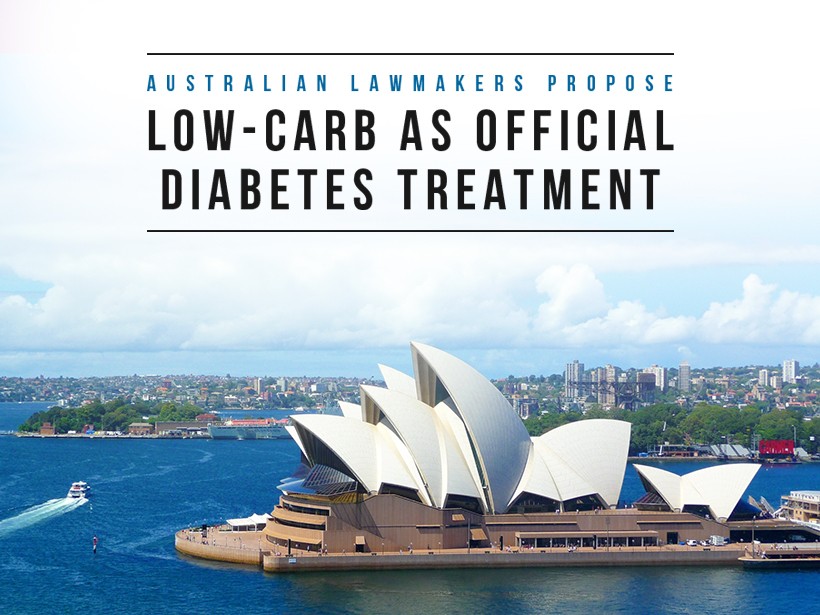There is a bounty of emerging research and case studies that show the benefits of low-carb (and specifically keto) dieting when it comes to dealing with Type 2 diabetes (T2D). For years now, doctors around the world have been looking into low-carb dieting as a supplement or alternative to insulin therapy.
While individual doctors and clinics may be exploring these latent possibilities, national dietary guidelines and other forms of official guidance for diabetes and other obesity-related diseases have lagged far behind. Take, for example, the long process of getting the U.S. Nutrition Facts Label to be marginally more informative when it comes to the amount of added sugar in grocery store items.
Low-carb health solutions as a new standard
Lawmakers in Australia, however, are on the verge of a major breakthrough in dealing with high rates of diabetes. The members of the Parliament's Education and Health Standard Committee drafted a recent report stressing the importance of helping Type 2 diabetics work towards complete remission, not just management. The method? National dietary guidelines for people recently diagnosed with T2D should include the benefits of a low-carb diet, and stress its fundamental importance for beating the disease.
In preparing their report, lawmakers interviewed Dr. David Unwin, a British National Health Service Innovator of the Year. As a researcher and general practitioner, Dr. Unwin has pioneered studies on the dangers of excess carbs and the role of diet in treating diabetes.1
“This is the message from…Dr. David Unwin,” the report reads, “not one of deprivation but one of replacement, rebalancing and flourishing through food choices that ensure blood sugar levels remain stable, putting consumers in control.” The benefits of ketogenic dieting, referred to as “very low-carbohydrate” dieting, are included in the report.2
A growing trend for national health advice
While it is not yet clear whether the Australian Parliament will act, the committee report is in and of itself a breakthrough in the world of official health advice (which can be shockingly bad when it comes to diet). Hopefully, this research will serve as a template for other lawmakers.
And where better to begin than the U.S.? The national dietary guidelines are due for an update in 2020, and health officials have said that the research on low-carb dieting will be taken into consideration.3 If we’re lucky, the Australian report is a symbol of change on the horizon, as the common and official reputations of the keto diet continue to surge.
NUTRITIONAL DISCLAIMER
The content on this website should not be taken as medical advice and you should ALWAYS consult with your doctor before starting any diet or exercise program. We provide nutritional data for our recipes as a courtesy to our readers. We use Total Keto Diet app software to calculate the nutrition and we remove fiber and sugar alcohols, like erythritol, from the total carbohydrate count to get to the net carb count, as they do not affect your blood glucose levels. You should independently calculate nutritional information on your own and not rely on our data. The website or content herein is not intended to cure, prevent, diagnose or treat any disease. This website shall not be liable for adverse reactions or any other outcome resulting from the use of recipes or recommendations on the Website or actions you take as a result. Any action you take is strictly at your own risk.
- California Pushes for Cigarette-Like Warning Labels on Soda - July 1, 2019
- Is a Slowdown in Australia's Sugar Consumption a Sign of More to Come? - June 24, 2019
- Groundbreaking Study Says the Sugar Rush Doesn't Exist - June 12, 2019
































Comments (5)
Very good news, I used to have T2D, but took off 40kg and could stop taking all medications in less than 14 months from august 2013 to october 2014. a couple of years later my T2D was reversed and i no longer have to take any meds or see the doctor regularly. A publisher here in Norway wanted to do a story on me at the time (in Norwegian): https://lillemane.no/stigs-storslagne-suksesshistorie/
I think this is a report to the Parliament of WA: Western Australia, one of the states of Australia. (It is not to the Federal Parliament, that sits in Canberra).
Tim Noakes proved this years ago, another first for South Africa!
Sorry about the bad grammar, auto-correct and small review windows are not conducive to good writing for me! Lol
I have was diagnosed as diabetic 12 years ago. My doctor wanted to put me on meds, I refused. With an A1C above 12, things seemed dire, so I began my quest for diabetic information. 12 years later my A1C, as of 4/19, is 5.8! I have taken no drugs. My low class study of diabetes revealed that lifestyle change is the only viable method of tretention for type 2. Low carb and low sugar and I am walking proof. The meds are poison! I am 71 years old, retired from teaching at a local technical college, and now back to near full-time construction. I would be glad to share my more detailed results.